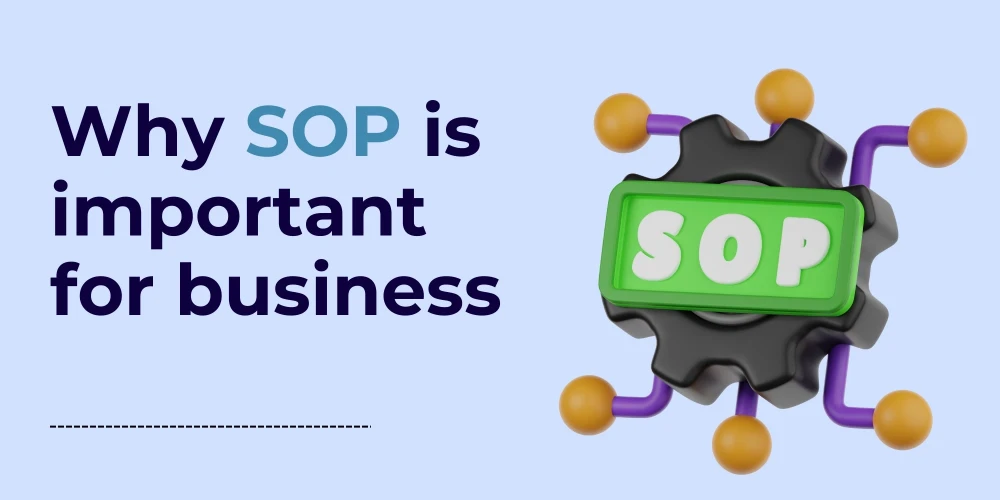Table of Contents
8 Reasons Why SOPs are Important for Your Business
In today's dynamic business environment, organizations face increasing pressure to maintain operational excellence while adapting to rapid change and growing competition. Standard Operating Procedures (SOPs) have emerged as crucial tools for business success, transforming from simple instruction manuals into strategic assets that drive organizational efficiency and growth. From startups to established enterprises, businesses that effectively implement and maintain SOPs gain significant advantages in operational consistency, risk management, and scalability. Understanding the importance of SOPs is essential for business leaders who must balance standardization with innovation while navigating complex operational challenges.
What Are Standard Operating Procedures (SOPs)?
Standard Operating Procedures represent detailed, written instructions that describe how to perform routine business activities consistently and effectively. At their core, SOPs serve as an organization's operational blueprint - documenting best practices, ensuring regulatory compliance, and maintaining quality standards across all business functions. These documented procedures act as the foundation for operational excellence, providing clear guidelines for employees while preserving institutional knowledge.
SOPs typically encompass several key elements:
- Step-by-step instructions for completing specific tasks
- Clear definitions of roles and responsibilities
- Quality control checkpoints and standards
- Required resources and tools
- Safety protocols and compliance requirements
- Exception handling procedures
- Documentation and record-keeping guidelines
Modern SOPs extend beyond simple checklists to encompass sophisticated documentation frameworks that include process maps, decision trees, role matrices, and quality control parameters. They typically operate across three critical dimensions: procedural documentation that outlines step-by-step instructions, technical specifications that detail system and tool requirements, and compliance guidelines that ensure adherence to regulatory standards and industry best practices.
When properly developed and implemented, SOPs become more than just documentation - they transform into valuable assets that drive operational excellence, ensure consistency, and enable continuous improvement.
Benefits of Implementing SOPs
#1 Consistency and Uniformity in Operations
The impact of SOPs lies in their ability to establish and maintain operational consistency across all organizational levels. When properly implemented, SOPs create a standardized operational framework that ensures every team member, regardless of location or department, follows identical processes to achieve desired outcomes. This standardization proves particularly crucial for organizations with multiple locations, remote teams, or complex supply chains.
In practice, operational consistency manifests through uniform product quality, standardized service delivery, and aligned cross-functional processes. Organizations with robust SOPs report significant improvements in quality metrics, customer satisfaction scores, and operational efficiency. Furthermore, this consistency creates a foundation for meaningful performance measurement and continuous improvement initiatives, as variations in outcomes can be more easily attributed to process deviations rather than procedural inconsistencies.
#2 Boosting Efficiency and Productivity
SOPs serve as powerful catalysts for operational efficiency by eliminating decision fatigue, reducing process variability, and optimizing resource utilization. By providing clear, standardized guidelines for routine tasks, SOPs free up cognitive resources for more strategic thinking and innovation. This systematization of operations leads to measurable improvements in throughput times, resource allocation, and overall productivity.
The efficiency gains manifest in multiple ways such as reduced training time for new employees, decreased error rates in routine operations, and improved process cycle times. Organizations that successfully implement comprehensive SOPs often report significant reductions in operational costs, with some studies indicating efficiency improvements of up to 30% in standardized processes. Additionally, well-documented SOPs enable organizations to identify and eliminate redundant steps, streamline workflows, and optimize resource allocation across different operational areas.
#3 Ensuring Compliance with Regulations
In an era of increasing regulatory scrutiny and complex compliance requirements, SOPs play a crucial role in ensuring organizational adherence to legal and industry standards. Well-designed SOPs incorporate regulatory requirements directly into operational processes, making compliance an integral part of daily operations rather than a separate oversight function.
These procedures create audit trails, document control processes, and establish clear accountability mechanisms that prove invaluable during regulatory inspections or audits. Furthermore, SOPs help organizations stay ahead of regulatory changes by providing a structured framework for updating and communicating new compliance requirements across the organization. This proactive approach to compliance not only reduces regulatory risks but also builds trust with stakeholders and customers.
#4 Improving Training and Employee Onboarding
Comprehensive SOPs transform the employee training and onboarding process from an ad-hoc exercise into a structured, repeatable system. By providing clear, documented procedures for every critical operation, SOPs significantly reduce the learning curve for new employees while ensuring consistent knowledge transfer across the organization.
The impact extends beyond initial training, creating a foundation for continuous learning and skill development. SOPs serve as living documents that capture institutional knowledge, best practices, and lessons learned, making them invaluable resources for employee development and succession planning. Organizations with well-implemented SOPs report faster onboarding times, improved employee confidence, and reduced training costs.
#5 Reducing Errors and Enhancing Quality Control
Error reduction and quality control represent critical benefits of robust SOP implementation. By establishing standardized procedures and quality checkpoints, SOPs create multiple layers of defense against operational errors and quality deviations. These procedures incorporate best practices, lessons learned from past mistakes, and preventive measures that significantly reduce the likelihood of errors occurring.
The quality control benefits manifest through reduced defect rates, improved customer satisfaction, and decreased waste in operations. SOPs also facilitate root cause analysis when issues do occur, as standardized procedures make it easier to identify where and why deviations occurred. This systematic approach to quality control creates a foundation for continuous improvement and operational excellence.
#6 Supporting Business Growth and Scalability
SOPs prove invaluable during periods of organizational growth, providing the structural framework needed to scale operations effectively. Well-documented procedures enable organizations to replicate successful processes across new locations, markets, or business units while maintaining consistent quality and performance standards.
The scalability advantages extend to various aspects of business operations, from new market entry to merger integration. SOPs facilitate knowledge transfer, standardize operations across locations, and ensure consistent customer experiences regardless of where or how services are delivered. This standardization proves particularly crucial for franchises, multi-location businesses, and organizations pursuing aggressive growth strategies.
#7 Facilitating Better Communication and Accountability
Clear SOPs establish explicit communication channels, reporting hierarchies, and accountability mechanisms within organizations. These procedures eliminate ambiguity about roles, responsibilities, and expectations, creating a foundation for effective organizational communication and performance management.
The communication benefits extend across all organizational levels, from front-line operations to senior management. SOPs clarify decision-making authorities, escalation procedures, and performance metrics, enabling more effective management and oversight of operations. Organizations with well-implemented SOPs report improved cross-functional collaboration, reduced conflicts, and more effective problem-resolution processes.
#8 Streamlining Decision-Making and Problem Solving
SOPs significantly enhance organizational decision-making capabilities by providing clear guidelines for routine decisions while establishing frameworks for handling exceptions and unusual situations. These procedures reduce decision fatigue, accelerate problem resolution, and ensure consistent application of organizational policies and standards.
The decision-making benefits manifest through faster response times to operational issues, more consistent policy application, and improved risk management. SOPs also create feedback loops that capture lessons learned and best practices, continuously improving the organization's problem-solving capabilities over time.
Conclusion
In an increasingly competitive business environment, well-designed and properly implemented SOPs have become essential for operational excellence and sustainable growth. NSKT's expertise in developing and implementing comprehensive SOP frameworks helps organizations transform their operations through standardization, efficiency, and continuous improvement. By combining industry best practices with customized solutions, NSKT enables businesses to create robust SOPs that not only ensure consistency and compliance but also drive innovation and competitive advantage in today's dynamic marketplace.







